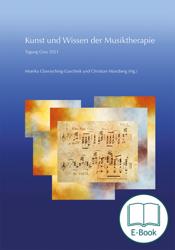Music therapy as an artistic-scientific discipline moves within a wide variety of theoretical systems. Since its beginnings, traditions have been developed over decades in the German-speaking world with today's enormous professional and empirical scientific knowledge. In many cases, the roots lie in humanistic concepts and psychotherapeutic approaches. Influences and concepts from the Anglo-American world are gaining in importance. This book summarises the contributions of the 10th Graz Music Therapy Day of the "Grazer Musiktherapie" (GRAMUTH), where the breadth of this knowledge was presented from four lines of tradition of music therapy, newer functional approaches as well as a current study and other contributions.
Music therapy as an artistic-scientific discipline moves within a wide variety of theoretical systems. Since its beginnings, traditions have been developed in the German-speaking world over the decades with an enormous amount of professional theoretical and practical experience and empirical scientific knowledge. In many cases, these roots lie in humanistic concepts and psychotherapeutic approaches. Currently, more than ever, influences and concepts from the Anglo-American world are gaining in importance. Nevertheless, the schools that have emerged in connection with psychotherapeutic concepts continue to appear as the more central approaches in the German-speaking world. This book points to the breadth of this knowledge, summarises central content-related and methodological core statements and can thus also contribute significantly to further basic research and teaching.
Music therapy, like any scientifically based method, is in a constant state of transition and development. Theories are expanded and adapted to new findings, new theories have to prove their effectiveness. Empirical evidence and studies show that music therapy has also established itself within the framework of scientific discourse.
The "Graz Music Therapy" (GRAMUTH) has also undergone an enormous development since its foundation in 2010 and was developed from an inter-university course to a regular Bachelor's and Master's programme in 2022.
Since the beginning, with the exception of the first Corona year, the "Grazer Musiktherapietag" (Graz Music Therapy Day) has been held annually and is now an internationally recognised specialist conference. For its 10th anniversary, which was postponed by one year, the content and scope of the conference was expanded and the theme was the "The Art of the Old and the Power of the New in Music Therapy" with the call to "Let’s go!", which also motivated people to continue in the wake of the Corona epidemic.
Four lines of tradition in music therapy - depth-psychological and psychoanalytic, integrative, anthroposophical, and morphological - were presented by renowned representatives whose lectures and workshops covered developments and current state of knowledge. In addition, new developments such as functional music therapy with methods of "neurological music therapy" by young graduates of Austrian training programmes as well as a current research project on "receptive music therapy with depressive patients" and other contributions were presented. These well-founded contributions of music therapy, the description of their artistry, their background knowledge, the current state of knowledge of the respective schools and their methodology are summarised again in this book.
Univ.Prof.in Dr.in med.univ. Monika Glawischnig-Goschnik,
born 1960
Physician, psychotherapist, music therapist;
Professor of Music Therapy at the University of Music and Performing Arts Graz (KUG) since October 2022
Previously assistant doctor in the psychosomatic-psychotherapeutic service at the LKH- Universitäts-Klinikum Graz since 1997
Lectureships in music therapy at the Universities of the Arts in Graz and Vienna since 1995
Main research interests: The intersection of therapy/pedagogy/art, resonance-based medicine, the bio-psycho-socio-eco-spiritual model
Christian Münzberg
born 1959
Dipl.-Social Pedagogue (FH) (Catholic University of Applied Sciences Munich KSFH, degree 1987)
Dipl. Music Therapist (University of Music and Theater Hamburg HFMT, degree 1997)
Musical training at the International School of Percussion at the Free Music Center in Munich (diploma 1987), since then numerous concerts, studio work, teaching activities
Music therapist, employed since 1991, registered Austria 2009, working in various clinics in the fields of neurology, psychiatry, psychosomatics and psychotherapeutic medicine, medical psychology, oncology, most recently psychiatric rehabilitation as well as in free practice and teaching
Psychotherapist group psychoanalysis/psychoanalytic psychotherapy, practicing since 1994, registered Austria 2012, experienced in the fields of psychosomatics and psychotherapeutic medicine, medical psychology, oncology and radiation therapy, currently employed in the outpatient psychiatric rehabilitation Pro Mente Reha - APR Graz, working as well in free practice and teaching
Group psychoanalytic team and organizational developer ÖAGG (diploma 2013)
1987-2008 lectureships at the two Munich Universities of Applied Sciences, 2009-2014 lecturer at the Medical University of Graz MUG, 2015-22 trainer at the University of Music and Performing Arts Vienna MDW
since 2009 lectureships, co-founder and member of the management team of the university course in music therapy (GRAMUTH) at the University of Music and Performing Arts Graz KUG, since 2022 senior lecturer and curricula commission chair at the University of Music and Performing Arts Graz KUG, studies in music therapy
Research interests and scientific publications in music therapy and psychotherapy with a focus on structure-related and mentalization-oriented music therapy and psychotherapy


 Preface
Preface